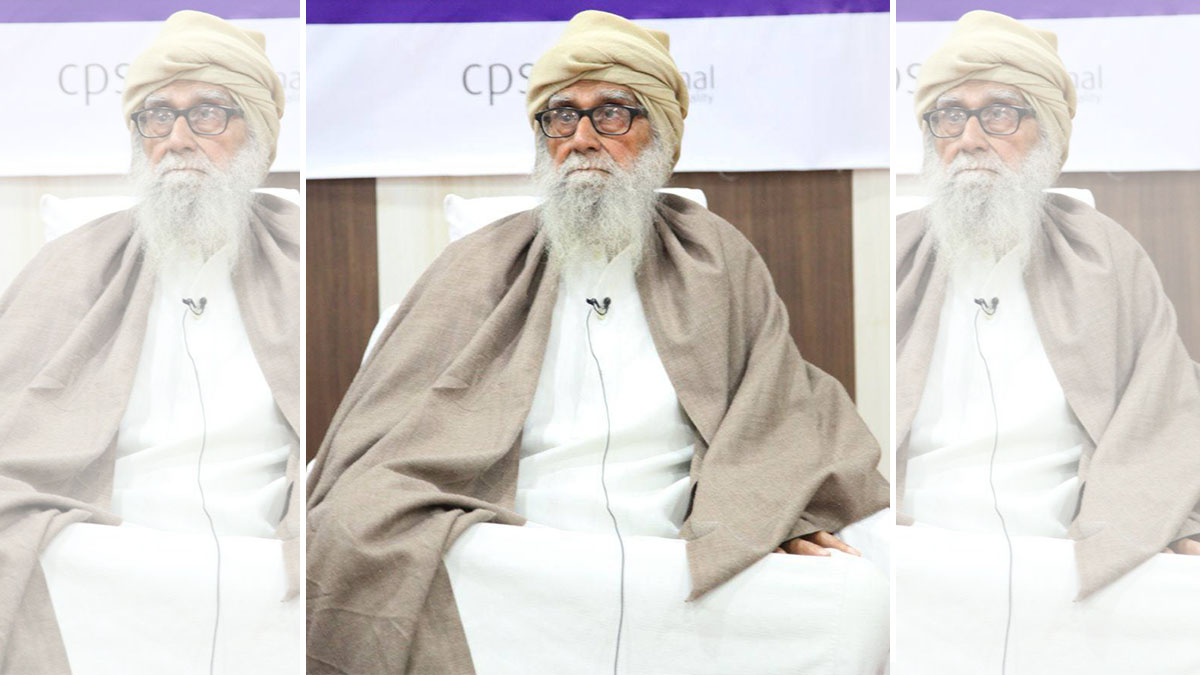New Delhi: Renowned Islamic Scholar and peace activist Maulana Wahiduddin Khan passed away in Delhi on Wednesday evening. The 96-year-old scholar had tested positive for COVID-19 last week and was in ICU at Apollo Hospital in the national capital.
Born in Azamgarh in 1925, Maulana Wahiduddin Khan comes from a family of staunch nationalists who played a key role in the 1857 mutiny for Independence.
A renowned activist, he has also written a two-volume commentary on the Holy Qur’an. To platform the ideas of peaceful coexistence, social harmony, and interfaith dialogue, Khan established the Islamic Centre in Delhi in 1970.
Six years later, he started a monthly magazine called Al-Risala, which primarily comprised his own articles that spoke to the Muslim community about their responsibilities. Al-Risala was launched in both English and Hindi in February 1984 and December 1990, respectively.
He has written over 200 books and a bulk of his oeuvre focused on secularism, inter-faith dialogue, social harmony and freedom of speech.
Khan was awarded India’s second-highest civilian award — the Padma Vibhushan — this year for his exceptional contribution in the field of spiritualism. He was also awarded the Padma Bhushan in 2000.
Let the Truth be known. If you read VB and like VB, please be a VB Supporter and Help us deliver the Truth to one and all.
Panaji (PTI): As part of a crackdown against tourist establishments violating laws and safety norms in the aftermath of the Arpora fire tragedy, Goa authorities on Saturday sealed a renowned club at Vagator and revoked the fire department NOC of another club.
Cafe CO2 Goa, located on a cliff overlooking the Arabian Sea at Vagator beach in North Goa, was sealed. The move came two days after Goya Club, also in Vagator, was shut down for alleged violations of rules.
Elsewhere, campaigning for local body polls, AAP leader Arvind Kejriwal said the fire incident at Birch by Romeo Lane nightclub at Arpora, which claimed 25 lives on December 6, happened because the BJP government in the state was corrupt.
An inspection of Cafe CO2 Goa by a state government-appointed team revealed that the establishment, with a seating capacity of 250, did not possess a no-objection certificate (NOC) of the Fire and Emergency Services Department. The club, which sits atop Ozrant Cliff, also did not have structural stability, the team found.
The Fire and Emergency Services on Saturday also revoked the NOC issued to Diaz Pool Club and Bar at Anjuna as the fire extinguishers installed in the establishment were found to be inadequate, said divisional fire officer Shripad Gawas.
A notice was issued to Nitin Wadhwa, the partner of the club, he said in the order.
Campaigning at Chimbel village near Panaji in support of his party's Zilla Panchayat election candidate, Aam Aadmi Party leader Kejriwal said the nightclub fire at Arpora happened because of the "corruption of the Pramod Sawant-led state government."
"Why this fire incident happened? I read in the newspapers that the nightclub had no occupancy certificate, no building licence, no excise licence, no construction licence or trade licence. The entire club was illegal but still it was going on," he said.
"How could it go on? Couldn't Pramod Sawant or anyone else see it? I was told that hafta (bribe) was being paid," the former Delhi chief minister said.
A person can not work without bribing officials in the coastal state, Kejriwal said, alleging that officers, MLAs and even ministers are accepting bribes.





